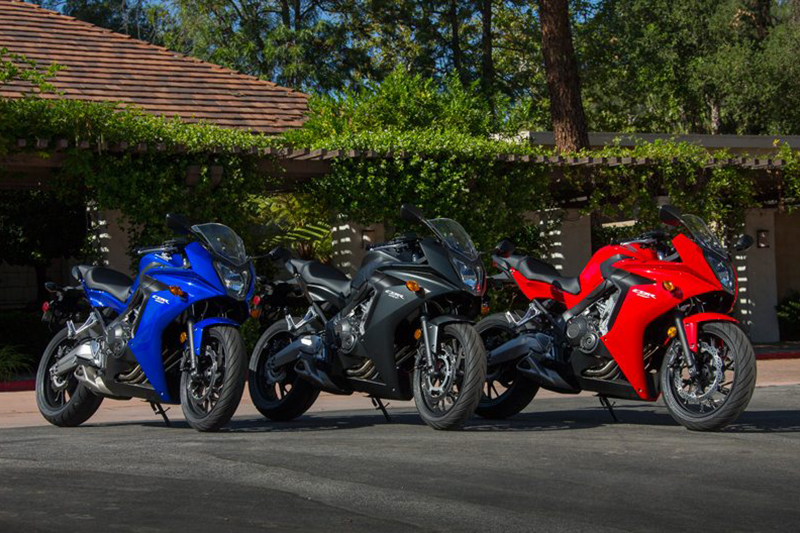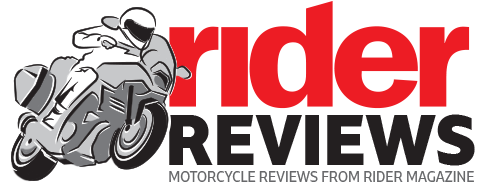2014 Honda CBR650F

First Ride Review
Photography by Kevin Wing
Since 2012, Honda has rolled out more than 30 new or updated models, everything from the playful new Grom 125 to a revamp of its mighty Gold Wing GL1800. (And that’s just street-legal motorcycles and scooters; the number is even higher if you include dirt bikes.) Many of the new models are on the value-priced, light-to-middleweight end of the scale, such as the Grom, a trio of 500s (CB500F, CB500X and CBR500R) and a bevy of 700s (NC700X, NC700X DCT, CTX700, CTX700N and NM4). Honda is giving the next generation of riders a wide range of options, while keeping prices relatively low by outsourcing some production to Thailand.
Still, there’s a gap in Honda’s sportbike lineup that needed to be filled. In the ladder of progression from the just-announced-for-2015 CBR300R ($4,399) to the updated-for-2014 CBR1000RR ($13,999), there’s a big jump in price and performance from the CBR500R ($6,299) to the CBR600RR ($11,490). Enter the all-new 2014 CBR650F, which at $8,499 ($8,999 with ABS) splits the price difference between the 500R and 600RR, and its horsepower and torque should fall somewhere in the middle as well.
Engine configuration was an important choice. Since the entry-level CBR500R and the displacement-competing Kawasaki Ninja 650 are both parallel twins, Honda opted for an in-line four, a layout associated with performance. Rather than adapt a previous-generation CBR600RR engine for milder performance, Honda designed an all-new powerplant that combines good low-to-midrange power with a smooth, high-revving nature (redline is 11,000 rpm). With an oversquare bore/stroke of 67.0 x 46.0mm, the liquid-cooled, fuel-injected, DOHC, 4-valves-per-cylinder engine displaces 649cc. Tilting the cylinder bank forward 30 degrees lowers the center of gravity and provides a straighter intake and exhaust pathway, which Honda says boosts both power and fuel efficiency. Spent gasses exit through a 4-2-1 exhaust system with a larger collector under the bike and a stubby silencer peeking out from under the right foot peg.
Smooth and quiet at idle, the CBR’s engine revs up quickly with the high-pitched wail and grips/tank/pegs buzziness you’d expect from an in-line four. Throttle response is crisp and direct, driveline lash is minimal and power delivery is smooth and linear. There’s enough excitement and howl to keep you interested, but nothing so abrupt or loud that it will scare a new rider or a sensitive neighbor. Engagement from the cable-actuated clutch is precise, rowing the six-speed gearbox is seamless and the chain final drive is light and simple.
The engine is a stressed member of the twin-spar, diamond-shape steel frame, which uses oval tubes for added vertical strength while allowing tuned flex in other directions, and the swingarm is cast aluminum. Honda says the claimed 461-pound curb weight is distributed almost 50/50 front and rear. Suspending the bike above the wheels is a non-adjustable 41mm fork with 4.3 inches of travel and a single shock with 5.0 inches of travel and preload adjustment only (seven settings; changes require a spanner that’s not included). Cheap bikes are notorious for cheap suspension, but the CBR650F offers better-than-expected compliance without undue bounciness or sponginess.
With clip-on handlebars perched just above the triple clamps and a moderate 31.9-inch seat height, the CBR650F’s seating position is a happy compromise between a hunched-over sportbike and a straight-back standard. Even though I’m tall with long legs, I never felt cramped or wished for more legroom. Seat comfort and wind protection are adequate, but neither is a high priority for a sportbike. The cockpit is tidy and attractive, with a fully digital instrument panel consisting of two LCDs—tachometer and speed on the left, everything else on the right.
Price-point compromises have to be made, and on the CBR650F they are most evident in the brakes and tires. The Nissin-made brakes feature wave-style rotors, two in front squeezed by two-piston calipers and one out back squeezed by a one-piston caliper. They’re weak and wooden, which might be acceptable for new riders who get overzealous at the controls; for everyone else, more power and feel are in order. ABS is available for $500 more, but only with the Matte Black Metallic paint job. (Non-ABS bikes are available in Red and Candy Blue.) Six-spoke cast aluminum wheels are shod with Dunlop Sportmax D222F tires in typical sportbike sizes (120/70-ZR17 front, 180/55-ZR17 rear). The rear tire is wider than it needs to be, which, along with the 25.5-degree rake and 57.0-inch wheelbase, makes the steering feel a tad heavy. The tires do a poor job of communicating what they were doing, and their grip is marginal.
Honda’s development objectives for the CBR650F were supersport styling, a step up in performance from parallel twins and an affordable price. With some of its fairing shapes shared with the pricier CBR-RR models and a unique triangular headlight with LED position lights, the slim, compact CBR650F looks the part. And it can be customized with Honda accessories, such as a sport windscreen, a seat cowl, a rear tire hugger, a rear carrier and trunk, and heated grips. Performance-wise, riders more interested in enjoyment than bragging rights will find a lot to like in this bike. But Honda overshot the mark a bit on price since its main competitors, the Kawasaki Ninja 650 ($7,699; $7,999 with ABS) and Yamaha FZ6R ($7,790-$7,890), are $700-$1,000 cheaper depending on specification. Which offers the most bang for the buck is a question only a comparison test can answer….
